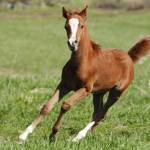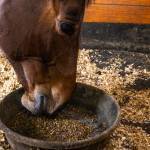Osteochondrosis in Foals: Mineral Supplementation May Decrease Incidence

Nutrition of foals is important in minimizing the occurrence of skeletal disease as horses grow and mature. Two studies conducted by researchers from Animal Health Services in the Netherlands analyzed the effect of supplementing young foals with minerals or a placebo. The results published in the Journal of Equine Veterinary Science indicated that foals supplemented with magnesium had a lower prevalence of osteochondrosis than their unsupplemented peers.
Several factors can contribute to the development of osteochondrosis in foals, and these factors and their interactions are not completely understood.The first study involved 64 mares and foals from five breeding farms. The mares and their foals, aged birth to five months old, were divided into two groups. The equines were given either supplementary minerals or a placebo. Blood samples were collected at intervals from the foals, and milk samples were collected from the mares. All samples were tested for bone biomarkers as well as levels of calcium, phosphorus, and magnesium.
Radiographs of the foals’ knees, hocks, and fetlocks were taken at the end of the study period. All joints were scored for the presence and severity of osteochondrosis. Bone development defects were found in 21.9% of mineral-supplemented foals, while 41.9% of foals in the placebo group were found to have signs of osteochondrosis.
The second study involved 54 mares and their foals aged 5 to 12 months old. The horses were divided into two groups, with half receiving mineral supplementation and half receiving a placebo. Periodic blood samples were taken and analyzed as in the first study, and radiographs were taken at the conclusion of the trial. When the radiographs were examined for signs of osteochondrosis, there was no change from earlier numbers in foals receiving the placebo. For foals in the mineral-supplemented group, there was a drop of 14.3% in incidence of osteochondrosis.
The authors concluded that supplementation of foals with magnesium was correlated to a reduction in the prevalence of osteochondrosis, though the reason for this reduction is not known.
Foal managers should consult an equine nutritionist before changing the mineral content of foal rations. Several factors can contribute to the development of osteochondrosis in foals, and these factors and their interactions are not completely understood. Mineral levels in foal diets are important not only in absolute quantity but also in ratio between the various minerals, and large variations from optimal supplementation can cause problems with skeletal development.








